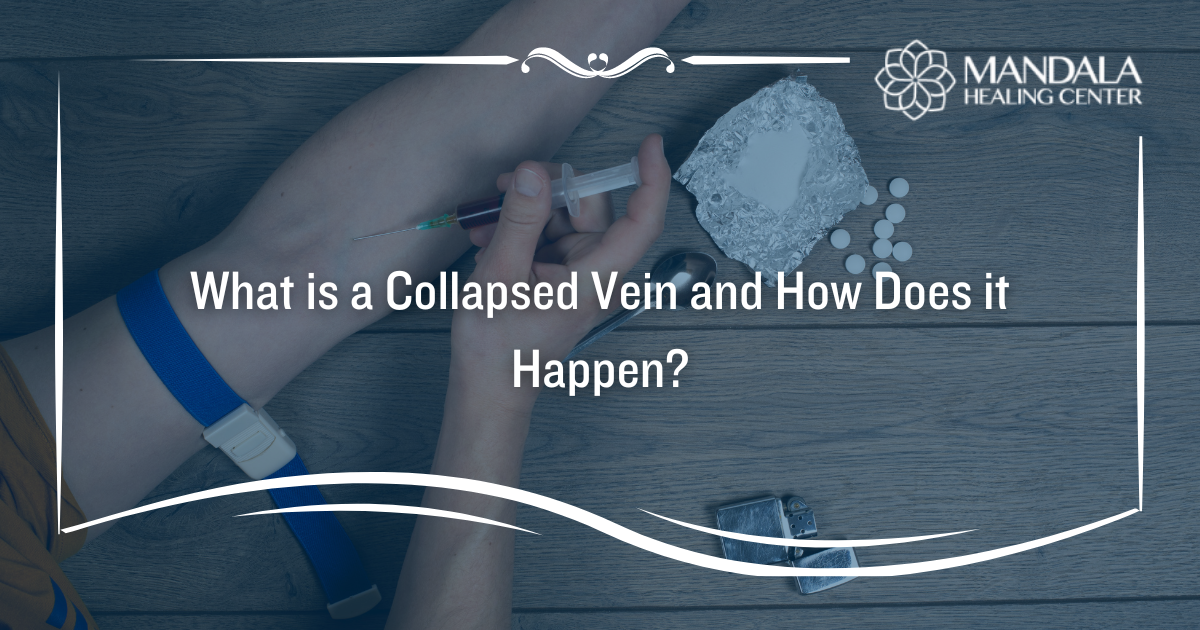Many people who abuse drugs progress from smoking or snorting to intravenous (IV) drug use. Intravenous drug use is the act of injecting a substance directly into your veins. This is the most dangerous method of administration when it comes to abusing any type of drug.
According to the World Health Organization, about 11 million people abuse drugs intravenously worldwide.[1]
When you inject drugs consistently into the same part of your body, your veins can collapse. Collapsed veins are one of the many risks associated with IV drug use.
What are Collapsed Veins?
Collapsed veins occur when the outer walls of a vein become inflamed, causing the vein to clot, harden into scar tissue, and cave inwards. As a result, blood is not able to flow through the vein and it heals shut.
In other words, collapsed veins are veins that have been used so much that they are rendered useless. It is important to note that collapsed veins are not a result of one injection. This happens after you repeatedly inject drugs into the same vein, causing extensive damage to the exterior walls of them.
How Do Veins Collapse?
Collapsed veins are a result of repeated IV drug use in the same vein. It can take weeks or even months of an individual using the same vein to shoot up for a vein to collapse. If you regularly engage in IV drug use, it’s important to know the signs of a collapsed vein.
The signs that a vein has collapsed include:
- Pain during injection
- Discoloration of the skin on top of a vein
- Swelling of the area
- Hardness of the vein
While a collapsed vein might not seem like a big deal, this complication can have serious consequences. First, collapsed veins increase your risk of infection, ulcers, and even necrosis due to blood loss in the skin. Additionally, you might deal with long-term swelling, numbness, and discoloration of the skin near the vein.
Can a Collapsed Vein Heal?
In some cases, collapsed veins will heal once the swelling dies down and the area is left alone long enough for healing to occur. However, permanent vein collapse is incredibly common among people who inject drugs.
The following factors increase your risk of permanent vein collapse:
- Using blunt needles
- Repeatedly using the same vein to inject drugs
- Removing the needle rapidly after injection
- Not using proper injection techniques
- Using substances that irritate and cause inflammation in the veins
While collapsed veins can heal, you are more likely to experience permanent damage if you continue injecting drugs. Collapsed veins might cause you to struggle with pain or discoloration at the injection site, cold feet or hands due to insufficient blood flow, and itchiness when the injection site begins to heal.
How to Prevent Collapsed Veins from IV Drug Use
The best way to prevent collapsed veins is to receive addiction treatment and stop injecting substances altogether. However, if you are going to continue engaging in IV drug use there are some precautions you can take to prevent your veins from collapsing.
To avoid collapsed veins, you should:
- Alternate injection sites to allow veins time to heal
- Always use new needles
- Avoid hitting arteries
- Never inject in small veins
- Never inject into bruised or swollen areas
- Clean the area beforehand to prevent debris from entering the vein
- Never tie a tourniquet too tight
- Remove the needle carefully and apply pressure to stop the bleeding
Other Risks and Dangers Associated With Injecting Drugs
Injecting drugs is the most dangerous way to abuse any type of substance. People who shoot up drugs typically use high-risk substances like crack cocaine, heroin, fentanyl, or methamphetamine.
IV drug use is associated with the following risks:[2]
- Overdose
- Addiction
- Dependence
- Skin infections and abscesses
- Necrosis of the skin
- Scarring and needle marks
- Endocarditis and other heart complications
- Contracting blood-borne diseases like HIV/AIDS
Most injectable substances contain dangerous bacteria that could cause you to develop serious and life-threatening infections. The Semel Institute for Neuroscience and Human Behavior explains that “one study estimated that up to 89 percent of injectable substances sold on the street are contaminated with at least one pathogen, often bacteria, and fungi, with 61 percent of heroin samples containing 160-37,000 organisms per gram.”[2]
Anyone who abuses IV substances should seek help from a professional drug rehab program as soon as possible.
Find Help for IV Drug Abuse and Addiction
If you or a loved one require addiction treatment for IV drug use, it’s time to seek help. Mandala Healing Center is here to provide you with all of the support and tools you need to maintain long-term recovery.
To learn more about our drug rehab programs, contact Mandala Healing Center today.
References:
- The World Health Organization (WHO): People who inject drugs, Retrieved July 2023 From https://www.who.int/teams/global-hiv-hepatitis-and-stis-programmes/populations/people-who-inject-drugs
- The Semel Institute for Neuroscience and Human Behavior: Potential Complications of IV Drug Use, Retrieved July 2023 From https://www.semel.ucla.edu/dual-diagnosis-program/News_and_Resources/Potential_Complications_Of_IV_Drug_Use












